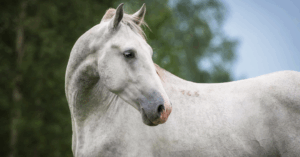
Gastro Pellet: Stomach Well-being Starts in the Mind
Anyone who spends every day around horses knows it well:…
Feed and products in 25kg bags excluded
Bank transfer | Paypal | Credit cards

One of the problems that most often lead owners to turn to Unika specialists is the thinness of their horses and the consequent need to increase their weight and improve their physical condition.
Firstly, it should be specified that there is a standardised system for assessing the physical condition of a horse which allows the professional, on the basis of scoring, to assess objectively whether the horse is in an underweight, normal or overweight state. This system is called the Body Condition Score (BCS) and can be evaluated on a 5 or 9-point scale. In the first case a horse is considered to be lean if it has a BCS score of 2 or less, in the second case, if the BCS value is equal to or less than 4. This score is obtained by evaluating the accumulation of fat and muscle development in certain areas of the horse’s body such as neck, withers, side, axillary region, back and croup, tail attachment, thighs. We will delve into this topic in one of the next articles.

Once it is established that the horse is in a state of thinness, it is necessary to trace the causes that have led to the establishment of this problem. Here are some of the most common:
What can cause nervousness in the horse’s diet is an excessive load of cereals, in particular flakes, which by their nature are particularly rich in sugar, which determine high glycaemic peaks, that is, high concentrations of glucose in the blood. For this reason, it is necessary to opt for feed with low cereal content and alternative ingredients such as soya and rice.
The calculation of food rations is often not an easy task, so it is always good to rely on specialized nutritionists.
If the cause of weight loss is a wrong diet, it will be enough to correct it to return the horse to an adequate physical condition. It is good to specify that every food change must take place gradually and it may take months before we see an appreciable result.

2. Problems with teeth
If the horse suffers from dental problems, chewing will be more difficult and incomplete, making it possible for partially broken food to enter into the stomach and intestines of the horse and therefore make it more difficult to digest. The horse will therefore be able to extract less energy from food:this means that if the diet is also balanced from an energy and nutritional point of view, the horse will be able to absorb only partially the elements contained in the food, which may not be sufficient to cover his needs. It is therefore essential to periodically check the horse’s teeth, especially in the case of elderly subjects, for whom it may be necessary to administer dissolved or softened food in water.

3.Parasitic infections in progress
A cause of thinness and/or weight loss is the presence of intestinal parasites, commonly known as worms. These parasites colonize the intestines of the affected horse to take advantage of it in terms of nutrition and reproduction. Intestinal parasites in fact deprive the horse of food, which is why one of the characteristic signs of their presence is the weight loss of the subject. Such infections can become chronic and pose a risk to the health of the horse. When a parasitic infection is in progress, it is absolutely necessary for your veterinarian to tell you which drugs to administer to eradicate the infection. For preventive purposes it is possible to administer about 3/4 times a year product based on phototherapeutic ingredients known in traditional medicine for their action on the removal of potentially harmful intestinal organisms, such as Enterowell, formulated with garlic, pumpkin seeds, oregano and savoury extracts.
4. Elderly horses
Elderly horses have less efficient digestive function than young and adult horses. This results in higher nutritional requirements due to the lower capacity to digest and absorb nutrients contained within the daily ration. In addition, older horses are often more susceptible to the problems described above, namely intestinal infections and issues with their teeth
A good strategy to counteract leanness in elderly subjects is to introduce in their diet a protein core such as Racing Feed: this allows the increase of the total protein intake into the diet as the assimilation of this macronutrient is particularly difficult for elderly horses. We already talked about this topic in our June blog, if you missed it you can find the link to the article here.
We have therefore analysed the 4 most common causes of thinness in the horse, but we want to clarify that this list does not replace the consultation by a professional, who will evaluate the horse as a whole and in its uniqueness, advising what actions to take to resolve the condition of thinness and improve the physical condition of the horse. If your horse also suffers from thinness and you need nutritional advice, the Unika team will be happy to give you support and help you formulate a proper diet for your horse.
Here is the change in Kitt, Sofia’s horse, one month after the change in his diet and the introduction of Racing Feed.



Anyone who spends every day around horses knows it well:…
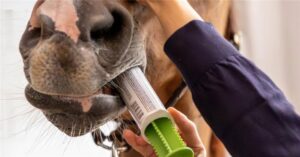
Intestinal parasites are a common and often underestimated problem in…
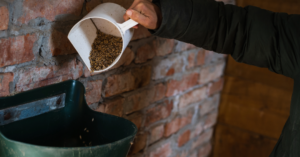
As September approaches, the quality and nutritional composition of pastures…
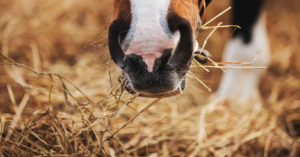
As September approaches, the quality and nutritional composition of pastures…
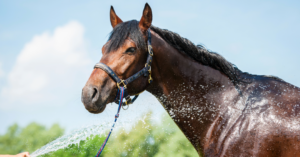
With the arrival of warmer weather, the competition calendar gets…

The importance Assessing your horse’s physical condition and determining whether…